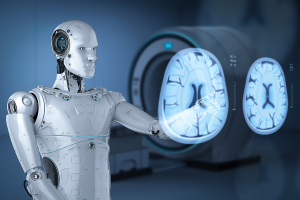by
John R. Fischer, Senior Reporter | November 03, 2023
According to a new study, radiologists and providers can expect to see a fivefold surge in the number of AI applications available in medical imaging by 2035.
Researchers at the Harvey L. Neiman Health Policy Institute and the American College of Radiology Data Science Institute made the prediction, assuming that funding increases continued at the same rate.
From 2013 to 2022, AI funding grew from $2 billion to $13 billion. As it takes about six years to fund and obtain regulatory approval for a solution, the researchers say this $13 billion will be invested into 147 new AI products that will be on the market in 2028.



Ad Statistics
Times Displayed: 46591
Times Visited: 1409 MIT labs, experts in Multi-Vendor component level repair of: MRI Coils, RF amplifiers, Gradient Amplifiers Contrast Media Injectors. System repairs, sub-assembly repairs, component level repairs, refurbish/calibrate. info@mitlabsusa.com/+1 (305) 470-8013
Using the historical relationship between the number of new products and past AI venture capital funding, they predict there will be $30.8 billion set aside for AI product development by then, which will go toward 350 new AI products that will be released in 2035.
“This is a fivefold increase from 69 in 2022,” said Eric Christensen, research director at the Neiman Health Policy Institute, in a statement.
In mid-October, the FDA
added 171 solutions that incorporate AI and machine learning applications to its list of devices marketed in the U.S. The majority were cleared or approved for use between August 2022 and July 2023. None incorporated generative AI, but the agency says that interest in these solutions, which identify, summarize, translate, predict, and generate content, has risen in recent months and will continue to grow more popular.
The majority (87%) of solutions authorized were in radiology (122); followed by 7% in cardiovascular (10) and 1% each in neurology (2), hematology (1), gastroenterology/urology (1), ophthalmic (2), clinical chemistry (1) and ear, nose, and throat (1). Radiology had the steadiest increase of any specialty.
It also provided insights in its list, saying that year-over-year increases in AI/ML-enabled devices slowed in 2021 (15%) and 2022 (14%) following a 39% increase in 2020, compared to 2019.
“In general, machine learning models have ranged in complexity from shallow (less than two hidden layers) models to more complex models (deep learning models). Models have generally trended toward more hybrid approaches, combining different algorithmic approaches to achieve the result of a safe and effective device (for example, using one model to generate features, and using another model to do classification),” said the agency.
The Harvey L. Neiman Health Policy Institute did not respond to HCB News’ request in time for the publication of this article.

